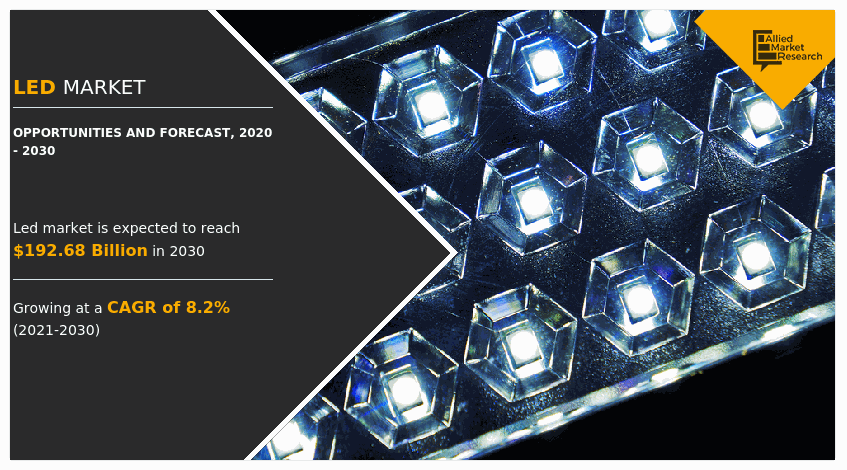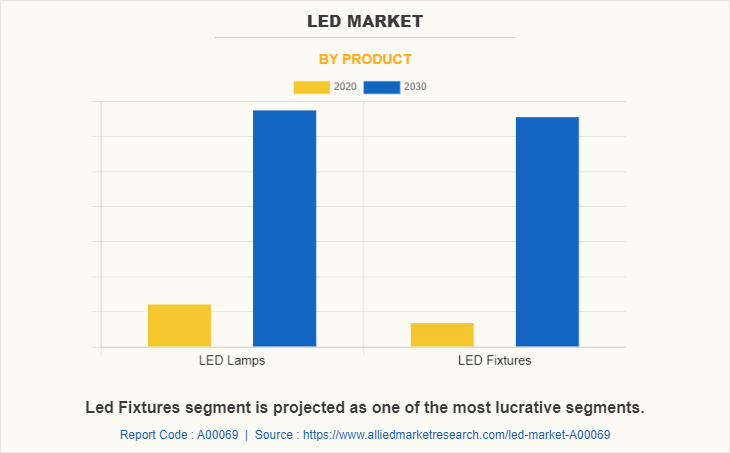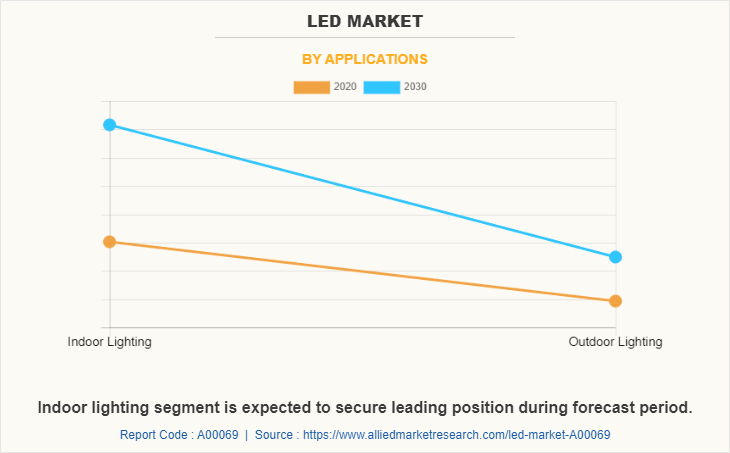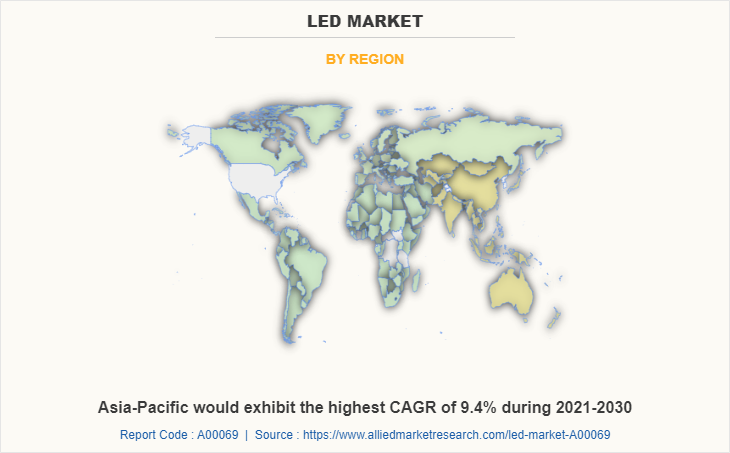LED Market Research, 2030
The Global LED Market was valued at $78.69 billion in 2020 and is projected to reach $192.68 billion by 2030, growing at a CAGR of 8.2% from 2021 to 2030.
A light-emitting diode (LED) is a semiconductor light source that converts electrical energy directly into light energy. These devices are often used in lamps as replacements for incandescent light sources. LED lighting is expected to be one of the most energy-efficient and rapidly developing lighting technologies in the global market. LED lights operate for a longer duration, are durable, and offer better lighting quality compared to traditional lighting technologies.

LED is expected to take over the conventional Compact Fluorescent Lamp (CFL) and Cold Cathode Fluorescent Lamp (CCFL) lighting market due to advanced features. Moreover, it is a cost-effective solution for all lighting as well as other applications, including backlighting in large-screen displays and non-backlight displays (OLED). Apart from the aforementioned cost benefit, the initial cost of LED lighting is very high and this restricts its initial acceptance. However, due to the longer lifespan of LEDs, the overall cost of the same is found to be very low in comparison to CFLs.
Consumers will gain awareness about the benefits of the longer lifespan of LED lamps which would increase the adoption of LED products such as LED lamps and ceiling lights. Growth in display backlighting applications, decrease in cost of LED lamps, longer life span, and high efficacy of LED are key factors that boost the LED market growth. The production of LED products such as ceiling lights and LED fixtures involves the implementation of a variety of technologies. Chips and components are the basic materials required to assemble and manufacture the final lamp. These are the different steps of the LED value chain. Some industries manufacture LED chips and components while some are involved in the production of lamps and fixtures. Furthermore, others are expected to be involved in all the steps to deliver the final product to the consumers.
Factors that drive the growth of the LED lighting market are less energy requirement which leads to financial savings, environment-friendly, owing to minimum use of mercury, and less flickering. Furthermore, the lower production cost of LED light is anticipated to provide a lucrative LED Market Opportunity.
Key Takeaways
- The global LED market study covers 20 countries. The research includes a segment analysis of each country in terms of value for the projected period.
- More than 1,500 product literature, industry releases, annual reports, and other such documents of major led industry participants along with authentic industry journals, trade associations' releases, and government websites have been reviewed for generating high-value industry insights.
- The study integrated high-quality data, professional opinions and analysis, and critical independent perspectives. The research approach is intended to provide a balanced view of global markets and to assist stakeholders in making educated decisions to achieve their most ambitious growth objectives.

Various factors significantly affect the LED market. Factors such as an increase in demand for cost-effective and energy-saving LED lighting, government initiatives toward LED adoption, and a surge in the need to replace traditional lighting systems drive the growth of the LED market. However, the high initial cost of LED lighting technology and the presence of voltage sensitivity & temperature dependence hamper the market growth. Furthermore, an increase in the adoption of smart lighting systems and LED display backlighting is expected to offer lucrative growth opportunities for the LED market outlook.

LED Market Segment Overview
The LED market size is segmented based on product, application, end-user, and region. Based on product, the market is categorized into LED lamps and LED fixtures. Depending on the application, it is classified into indoor lighting and outdoor lighting. According to end users, it is categorized into residential, industrial, commercial, and others. Region-wise, the global LED market trends were analyzed across North America, Europe, Asia–Pacific, and LAMEA.

Top Impacting Factors
The notable factors positively affecting the global LED market include an increase in demand for cost-effective & energy-saving LED lighting, government initiatives toward LED adoption, and a surge in the need to replace traditional lighting systems are expected to fuel the market growth. However, the high initial cost of LED lighting systems and voltage sensitivity & temperature dependence are expected to hinder the market growth.
Competitive Analysis
The key players profiled in the report include Cree, Inc., Everlight Electronics Co., Ltd., General Electric Company, LG Innotek Co., Ltd., Lumens Co., Ltd., Lumileds Holding B.V., Nichia Corporation, Koninklijke Philips N.V., Osram Licht AG, and Seoul Semiconductor Co. Ltd. LED market key players have adopted strategies, such as product portfolio expansion, mergers & acquisitions, agreements, geographical expansion, and collaborations to enhance their position in the LED industry.
The LED market revenue experienced a decline in its growth rate, owing to delayed construction projects. However, the demand for UV LEDs from the medical industry accelerated during the pandemic. Furthermore, market players invested in the R&D of smart lighting systems, owing to new government initiatives across the globe. Therefore, the LED market size was anticipated to gain momentum by the end of 2021.
Gradual production by Original Equipment Manufacturers (OEMs) and a reduction in demand for lighting systems & other electronic devices have hampered the growth of the LED market. Components and materials shortages significantly impacted the global supply chain. In addition, reductions in various capital budgets and delays in planned projects in various industries hampered the global economy.
Key Market Dynamics
LEDs consume significantly less energy compared to traditional incandescent and fluorescent lighting solutions. As energy efficiency becomes a global priority, particularly in both residential and industrial sectors, the demand for LED lighting has surged. Many governments worldwide are implementing policies to phase out energy-inefficient lighting and provide incentives for the adoption of LED technologies. Regulations on carbon emissions and energy savings further boost LED adoption. Continuous innovations in LED technology, such as advancements in chip design, improved brightness, and miniaturization, have expanded their use across various applications, from general lighting to displays and automotive lighting. LEDs are extensively used in televisions, computer monitors, smartphones, and other display devices due to their lower energy consumption, better color rendering, and longer life.
Regional/Country Market Outlook
- North America: Expanding automotive and healthcare industries that increasingly use LED technologies for lighting and display purposes. The U.S. market is the largest in North America, supported by significant investments in infrastructure, urbanization, and the ongoing transition to smart cities.
- Asia-Pacific: China dominates the LED market in Asia-Pacific, driven by massive production capacities, government support for energy-efficient technologies, and rapid industrialization. China is also a leading exporter of LED products.
- Europe: Stringent energy regulations by the European Union (EU) to reduce carbon emissions and phase out incandescent lighting. The UK is focusing on energy-efficient and smart lighting systems, particularly in commercial buildings and public infrastructure, as part of its green initiatives.
- Latin America & Middle East: The UAE is investing heavily in smart cities and sustainable infrastructure, driving the demand for LED lighting, particularly in public spaces and high-end residential projects. Argentina is promoting the adoption of LED technologies in its efforts to modernize the energy grid and reduce electricity consumption across sectors.
Report Coverage & Deliverables
This report delivers in-depth insights into the 3D display market by product, application, end-user, and region, and key strategies employed by major players. It offers detailed LED market forecasts and emerging trends.
Product Insights
LED Lamps are the most common LED products, replacing traditional incandescent and fluorescent bulbs in homes, offices, and commercial spaces. LED lamps offer energy efficiency, long life, and lower heat output, making them suitable for general lighting applications.
Application Insights
The growth in smart home technologies and energy-efficient buildings is driving demand for LED indoor lighting, particularly in developed markets. Governments and municipalities are increasingly adopting LED streetlights to reduce energy consumption and maintenance costs, as LED streetlights offer longer operational life and improved illumination. Offices, retail stores, hospitals, and educational institutions are transitioning to LED lighting for energy savings, improved aesthetics, and enhanced productivity. LEDs provide better illumination and are compatible with smart lighting systems in commercial buildings.
End User Insights
Commercial spaces require high-quality, energy-efficient lighting solutions to improve ambiance and reduce operational costs. LED lighting is widely used in shopping malls, hotels, restaurants, and office buildings for both functional and decorative purposes. The demand for LED lighting in the commercial sector is growing due to government regulations on energy efficiency and the need for cost-effective, environmentally friendly lighting solutions. The industrial sector is transitioning to LED lighting for cost-saving and safety reasons, particularly in hazardous environments where traditional lighting may pose risks.
Regional Insights
Asia-Pacific is the fastest-growing region for the LED market, driven by rapid urbanization, industrialization, and growing awareness of energy efficiency. The region is a major manufacturing hub for LED products. North America remains a leading market for LED products due to the high demand for energy-efficient lighting solutions, government policies promoting sustainable infrastructure, and widespread use of smart lighting systems.
Key Strategies and Developments
- In 2023 - Signify completed the acquisition of Intelligent Lighting Controls, Inc. (ILC), a market-leading U.S. manufacturer of wired control systems, expanding its connected portfolio. The acquisition aims to expand business in the North American market.
- In 2024 - OSRAM launched a new line of LED drivers aimed at improving energy efficiency and compatibility with smart systems, reflecting the industry's push toward sustainable and intelligent lighting solutions.
Key Benefits For Stakeholders
- This study comprises an analytical depiction of the global LED market size, current trends, and future estimations to depict the imminent investment pockets.
- The overall LED market analysis is determined to understand the profitable trends to gain a stronger foothold.
- The report presents information related to key drivers, restraints, and opportunities with a detailed impact analysis.
- The LED market forecast is quantitatively analyzed from 2021 to 2030 to benchmark the financial competency.
- Porter’s five forces analysis illustrates the potency of the buyers and suppliers in the industry.
- The report includes the LED market share of key vendors and market trends.
LED Market Report Highlights
| Aspects | Details |
| By Product |
|
| By Applications |
|
| By End User |
|
| By Region |
|
| Key Market Players | Cree, Inc., Nichia Corporation, Seoul Semiconductor Co. Ltd., Everlight Electronics Co., Ltd., Osram Licht AG, Koninklijke Philips N.V., LG Innotek Co., Ltd., Lumens Co., Ltd., General Electric Company, Lumileds Holding B.V. |
Analyst Review
The LED market holds high growth potential. This is attributed to the fact that presently, there is increase in the demand for LED lighting in the residential segment, particularly in the U.S., China, and India. Companies in this industry adopt various innovative techniques to provide customers with advanced and innovative product offerings. Increase in usage of LEDs in lamps as a replacement of incandescent light sources, owing to advantages such as longer shelf life, low power requirement, and small sized & robust attributes, is a major driver of this market.
The global LED Market is expected to witness high growth rate in the future, due to high efficiency offered by LEDs and favorable government regulations toward reducing cost and pollution. However, high initial cost and voltage sensitivity & temperature dependence impede the market growth.
Considering the regional trends of the LED market, Asia-Pacific is expected to account for the highest revenue in the global market throughout the forecast period. However, LAMEA is expected to grow at a higher growth rate, predicting lucrative growth opportunities for LED market.
The key players profiled in the report include Cree, Inc., Everlight Electronics Co., Ltd., General Electric Company, LG Innotek Co., Ltd., Lumens Co., Ltd., Lumileds Holding B.V., Nichia Corporation, Koninklijke Philips N.V., Osram Licht AG, and Seoul Semiconductor Co. Ltd.
The global LED market was valued at $78.69 billion in 2020 and is projected to reach $192.68 billion by 2030, growing at a CAGR of 8.2% from 2021 to 2030.
The LED market encompasses the production and sale of light-emitting diodes, which are semiconductor light sources converting electrical energy directly into light energy.
Major companies in the LED market include Philips Lighting, OSRAM GmbH, Acuity Brands, Inc., Fagerhult Group, and Eaton Corporation.
Asia-Pacific is expected to be the leading contributor to the global LED market, followed by Europe and North America.
Key drivers include the high demand for cost-effective and energy-saving LED lighting, government campaigns promoting LED adoption to reduce costs and pollution, and the surge in need for replacing traditional lighting.
Challenges include voltage sensitivity, temperature dependence, and the high initial cost of LEDs, which may hinder market growth.
Loading Table Of Content...


